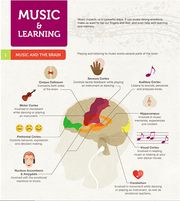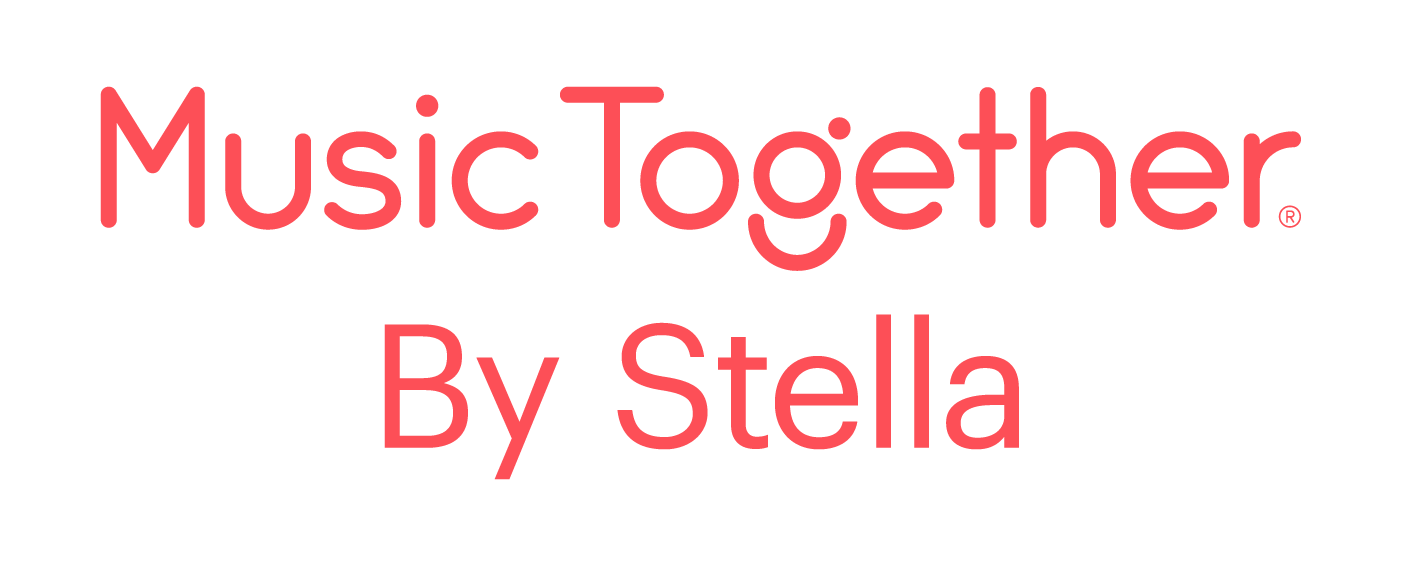|
|
|
|
|
|
|
|
Music Together by Stella
Level Up Your Child’s Learning with Music

Music: The Brain Builder
Check out the National Association for Music Education blog for the full infographic showing the impact of music on the brain.
We’ve all experienced a mood boost when we belt out a ballad while driving or have a hairbrush mic-drop moment.
It’s (literally) because of our brains! Singing increases production of dopamine and serotonin, the so-called feel-good and happiness hormones.
It also puts many of our brain regions to work, strengthening our neural pathways.
Neural connections are kind of like our nervous system superhighways, and they’re formed through our experiences and habits.
When we take part in activities that strengthen them, it’s easier to learn and grow throughout our lives.
For young children, whose brain architecture is forming, music-making can be even more impactful.
You see, by our mid-twenties, our neural pathways are pretty much done being built, but they’re just coming together for babies and toddlers.
In fact, our brains are more active during the first five years of life than they will ever be.
Positive early experiences create strong neural pathways—and a strong foundation for all future learning.
Here’s how music acts as a brain architecture superhero.
Because music is accessible and enjoyable for young children, they are likely to repeat songs they like over and over (and over), especially when the grownups they love sing with them.
This repetition and engagement exercises important neural pathways, making them stronger and supporting the development of a sturdy brain foundation.
And all you have to do is sing!
Building Community Connections
Turns out that sharing music experiences with others can activate similar neural connections in all participants’ brains.
This synchronization leads to those feelings of togetherness we remember long after the event.
The brain connections also foster positive social interactions and increased empathy within the group.
And adults aren’t the only ones who feel this; so do young children! In fact, research suggests that active music-making with others supports many parts of socio-emotional development, including self-regulation, self-confidence, leadership skills, social skills, and more.
In one study, preschoolers who engaged in joint music and movement activities showed greater group cohesion, cooperation, and prosocial behavior when compared to children who did not engage in the same music activities.
This increased empathy and commitment (e.g., feeling of “we”) was theorized to emerge from the shared intentions and collective goal of singing and dancing together. Even in infancy, adult-child music and movement interactions can lead to increased rhythmic AND emotional coordination and connection.
Researchers propose this might support infants’ earliest abilities to engage in positive social interactions with others.
Cool, right? And . . . all you have to do is sing!
As you can see, simply singing with your children does so much for them.
In addition to being a stress reliever and energy builder for everyone, making music supercharges learning.
(That’s why we like to say Music Learning Supports All Learning®.) What we’ve covered here is just the beginning. If you’re looking to learn more about music and early learning, find more right here on the blog and, if you are enrolled in class, your Music and Your Child guide. (Ask your teacher if you need a new copy.)
There’s a lot we don’t know about how this academic year is going to go, but one thing is certain: Singing, dancing, and jamming with the little ones we love helps them develop a lifelong love of music—and develop a strong foundation for all future learning.
用音樂提升孩子的學習水準
由Music Together於2021年9月22日發佈

音樂是大腦的建構者
顯示音樂對大腦影響的完整資訊圖表。
當我們在開車時,開始忍不住放鬆唱歌,當下都能感受到愉悅的心情。
這是因為唱歌會使大腦增加多巴胺和血清素的產生,即所謂的感覺良好和幸福荷爾蒙。
它還使我們的許多大腦區域發揮作用,加強我們的神經通路。
神經連接通路有點像在大腦中的高速公路,它們是通過我們的經歷和習慣形成的。
當我們多活絡、加強它們時,可以幫助未來一生中的學習和成長會更容易。
相比成人,對於大腦結構正在形成的幼兒來說,音樂創作的影響是更大的,成人的神經通路幾乎已經建成了。
事實上,我們的大腦在生命的頭五年比之後任何時期都更活躍。 積極的早期體驗創造了強大的神經途徑,並為所有未來的學習奠定了堅實的基礎。
以下是音樂作為大腦建構的作用。
由於音樂對幼兒來說是可訪問和愉快的,他們可能會一遍又一遍地重複他們喜歡的歌曲,特別是當他們喜歡的成人和他們一起唱歌時。
這種重複和參與運動了重要的神經通路,使它們更強壯,並支援堅固的大腦基礎的發展。
你所要做的就是唱歌!
建立社群網絡
回想一下你上次和一群人一起唱歌或跳舞是什麼時候?
也許是在婚禮上喝醉跳舞? 在戶外音樂上一起唱歌? 在體育場與其他球迷一起唱跳應援歌曲?
即使已經過了一段時間了,你還會記得你和周圍的人之間的互動連繫,即使他們是陌生人。
回到大腦,幫助我們瞭解正在發生的事情。
還記得那些神經通路嗎?
事實證明,與他人分享音樂體驗可以在所有參與者的大腦中啟動類似的神經連線。
這種同步導致了事件發生後很久後我們記憶中的那些團聚感。
大腦連線還促進了積極的社會互動,並增加了群體內的同理心。
成年人並不是唯一有這種感覺的人;年幼的孩子也是如此!
事實上,研究表明,與他人一起積極創作音樂支援社會情感發展的許多部分,包括自我調節、自信、主管技能、社交技能……等。
在一項研究中,與不從事相同音樂活動的兒童相比,從事聯合音樂和運動活動的學齡前兒童表現出更大的群體凝聚力、合作和親社會行為。
這種增加的同理心和承諾(例如,對“我們”的感覺)理論上是源於一起唱歌跳舞的共同意圖和集體目標。
即使在嬰兒期,成人和兒童的音樂和運動互動也可以增加節奏和情感協調和聯絡。研究人員提出,這可能會支援嬰兒與他人進行積極社會互動的最早能力。
酷,對嗎? 而且......你所要做的就只是唱歌!
正如你所看到的,簡單地和你的孩子一起唱歌對他們有很大的作用。
(這就是為什麼我們說音樂學習支援所有學習)。
我們在這裡介紹的只是個開始。
如果您想瞭解更多關於音樂和早期學習的資訊,可在官網上找到更多資訊。
我們不知道今年會如何發展,但有一件事是肯定的:唱歌、跳舞和與我們所愛的小傢夥混在一起,
有助於他們培養對音樂的終身熱愛,並為未來的所有學習奠定堅實的基礎。

